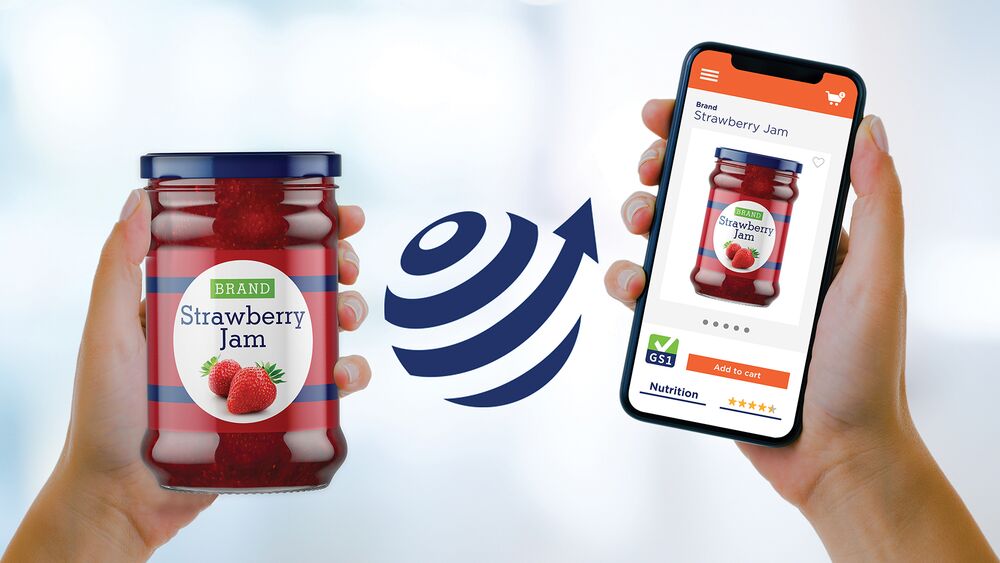




In common parlance, many people know the GTIN as a barcode, but technically the GTIN is the number below the barcode symbol itself, and can therefore also be used for other technologies such as 2D barcodes and RFID tags.
A digital product passport (also called DPP) is a set of sustainability data associated with physical products. It can be built through GS1 standards, among others, and allows you to verify, manage and make the sustainability of your product visible in practice.
The purpose of the digital product passport is to enable and highlight circular products and business models and to promote more sustainable consumption.
This allows each product to be uniquely identified and digitally linked to one or more data sources with information about the individual product.

Digital product passports help us repair, reuse and recycle our products, making better use of our raw materials and protecting the environment.
Discover how GS1 standards help you implement digital product passports.
Digital product passports outline circular products and business models. The product passport thus assigns a unique identity to the product, which is linked to one or more data sources.
It gives businesses and consumers easy access to product information such as durability, origin, warranty, recycling and instructions for assembly or repairs directly from the supplier, or other data sources chosen by the supplier.


In one hour, we give you the knowledge you need to get ready for digital product passports from 2027.
Also discover where GS1 standards can make your work with the many new regulatory requirements easier and how to get started.
The webinar recording is ready for you to watch at your convenience.
Europe is at the beginning of its transformation to a more circular economy and aims to become the world's most sustainable region. Digital product passports are included in a new EU legislative framework - the Ecodesign for Sustainable Products Regulation (ESPR), as part of the EU Green Deal, with the aim of fulfilling Europe's commitment to the Paris Agreement and the UN Sustainable Development Goals.
The proposal covers virtually all physical products on the European market in all product areas with the exception of food, animal feed and medical products, where other legislation with similar requirements applies. The law was voted through in April 2024 and journalized in July of the same year, after which the rules will be rolled out gradually until 2030.

Digital product passports have already been introduced for automotive and industrial batteries. Watch the short video for a concrete example of how it works in practice.
GS1 standards enable digital product passports to work in practice. Especially standards for identification, labeling and sharing. Including 2D barcodes and GS1 Digital Link are particularly relevant for digital product passports.
This means that GS1 standards provide online access and product information from the same barcode can be scanned by consumers with mobile phones, at the point of sale and by all parties in the supply chain.
GS1 Denmark has a driving role in enabling solutions for digital product passports. We are active in the global standardization work at GS1 to further future-proof the GS1 standards as the foundation of circular value chains.

The organization drives the development of product passports for industrial batteries.

The mission of the group is to develop prototype product passports on behalf of the European Commission.
Here is an overview of projects and cooperation at national and European level.

Pan-European project commissioned by the European Commission to develop three product passport prototypes.

Develops the underlying infrastructure for digital product passports.

The organization manages a number of projects for sustainable system transformation.

An innovation project led by Chalmers Industritekning with the aim of creating a traceability solution for electronic products.

Swedish furniture industry joins forces to achieve increased traceability of furniture with digital product passports

Aims to enable the traceability of materials and the sharing of materials-related information across the circular life cycle of materials.
Read more about the new EU regulation, Deloitte's report on the necessity of global standards in a regional circular transition and see the latest releases from GS1 in Europe - GS1's umbrella organization for the entire European region.
Read updates and news from home and abroad related to GS1.
Below you can find some of the questions and answers we have already received. Maybe it's something you're looking for too.









Curious to know more about digital product passports, how to order GS1ID, get a GLN, make a barcode or similar?
You can find answers to many of the questions we receive most often from members via the button below. You are of course also welcome to contact us.